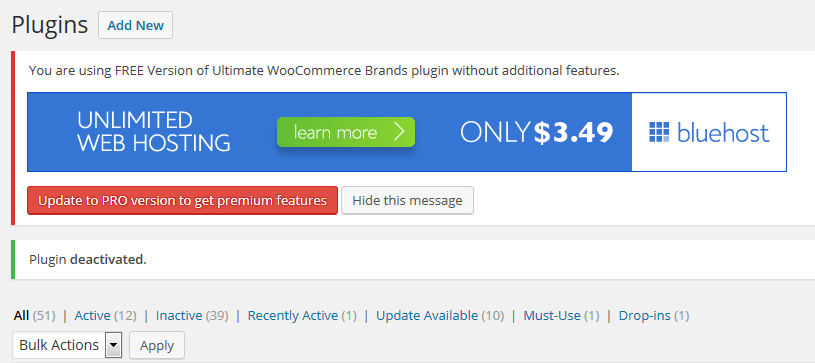On the Advanced WordPress Facebook group, a member recently raised the issue of display banner advertising in plugins. After installing Ultimate WooCommerce Brands developed by MagniumThemes, a large admin notice appears with an affiliate linked display banner for Bluehost.

Ultimate WooCommerce Brands is a freemium plugin and while I’m not against plugin authors making a few bucks through advertising, displaying a webhosting banner seems irrelevant.
The advertising banner also shows up on every admin page in the WordPress backend which I feel abuses the admin notice function, even though there’s a “Hide This Message button”. Upsells and advertising should be confined to the plugin’s activation and settings pages according to number 11 of the WordPress plugin directory guidelines:
Plugins should not hijack the blog admin. It is fine to include an Upgrade prompt on the plugin admin page, but not throughout the blog. It is acceptable to embed a widget on the dashboard but this should be the same size as others and be dismissable. It’s fine to put an error message at the top of the admin for special cases, but it should be linked to a way to fix the error and it should be infrequent. Any form of “nagging” is absolutely prohibited.
Samuel ‘Otto’ Wood, a member of the group and plugin review team confirmed that plugins that display advertising on every admin page violate the guidelines and users should report them by emailing plugins at wordpress.org.
The Guidelines Provide Wiggle Room
The plugin review team polices content in plugins, prevents spam, and attempts at bad faith from entering the directory. They also advise authors when they feel something that the plugin does is a bad idea. It’s important to note that the guidelines are not black and white. Instead, they’re somewhat subjective which allows the team to make decisions on a case by case basis.
The Power of Reviews
The WordPress plugin directory gives users an opportunity to provide feedback directly to plugin developers and users through reviews. Reviews are an excellent way to tell the developer why you dislike or like a plugin and it also gives fellow users in the community a heads up.
So far, no one has mentioned the display advertising in their reviews of Ultimate WooCommerce Brands. Perhaps it’s not an issue or users have chosen to disable it and move on to a different option. One of the benefits of WordPress is that there’s usually more than one plugin available to accomplish a task.
Jan Dembowksi, a volunteer moderator for the WordPress.org support forums, explains another benefits to reviewing plugins “Some of the forum moderators read every review. Occasionally, there may be a pattern if there’s a complaint such as not being able to dismiss the upsell banner or taking over the dashboard.
“Sometimes that leads to the moderator installing the plugin or theme on a test installation. This is to see if there’s really a problem or not. If there’s a valid concern then it gets reported up. It doesn’t happen often thankfully, but it has occurred and the plugin or theme author got a polite shoulder tap,” Dembowski told the Tavern.
What’s Your Breaking Point?
We know that upsells and display advertising are allowed in plugins as long as they follow the directory guidelines. How a plugin’s settings pages are displayed is up to the developer, but, as a user, how much advertising or upselling is too much? What’s your advertising limit inside a freemium plugin before you purchase the pro version or move on to an alternative?
Jeff, I think that this post just touches the tip of the bigger issue, which is how people build sustainable businesses from WordPress development.
You’re asking a legitimate question about what ‘users’ consider as reasonable promotion.
I’m sure that the authors of Ultimate WooCommerce Brands don’t want to see this huge banner on the admins of their sites. It would be interesting to see also what brings good developers to resort to displaying not-so-pretty banners by their plugins.